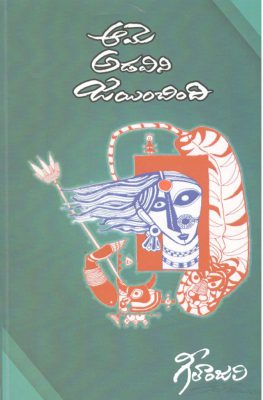
Ame Adavini Jayinchindi
(SHE CONQUERED THE FOREST)
( A review on the book composed by Dr. Geetanjali )
– V.Vijaya Kumar
Dr. Geetanjali’s 1999 novel Ame Advani Jayanchindi (She Conquered the Forest) is a profound and powerful exploration of the struggles, aspirations, and triumphs of women in rural India. Through the life of its protagonist, Sandhya, the novel vividly captures the challenges women face and their quest for autonomy in a society bound by tradition and entrenched in gender biases. Dr. Geetanjali’s work is not just a piece of fiction but a socio-political commentary that resonates deeply with the feminist discourse of its time, and it continues to be relevant even today.
A Life Shaped by Struggles and Convictions
Sandhya, the central character of the novel, is a woman of immense strength and conviction, whose journey mirrors the life of the author in many respects. Hailing from a rural petty middle-class family, Sandhya’s life is a testament to the fortitude of women who aspire to break free from the shackles of societal expectations. Her education at a medical university, her friendship with his fiance and later her husband Chandra, and books by authors like Ravi Shastri Chalam, particularly Ranganayakamma, sets the foundation for her progressive outlook on life, particularly concerning the empowerment of women through education and self-sustainability. Sandhya’s life is marked by her strong empathy for the rural poor, especially women, who suffer due to a lack of basic amenities like proper sanitation and hygiene—issues that she addresses both as a physician and as a socially conscious individual.
Marriage and Moral Dilemmas
Sandhya’s marriage to Chandra introduces another layer of complexity to her life. While their relationship is marked by mutual respect, it is also tested by the presence of Siddhartha, Chandra’s friend, who harbors romantic feelings for Sandhya despite being married to Arundhathi. Sandhya’s indecision and the emotional turmoil she has experienced for three years encapsulate the conflict between personal desire and societal expectations. The mental strain caused by Siddhartha’s advances leads to what she describes as an “irresistible headache,” a metaphor for the psychological burden she bears. Ultimately, Sandhya chooses to sever her friendship with Siddhartha, asserting her moral agency and reaffirming her commitment to her marriage and principles.
Breaking Free from the Chains of Tradition
One of the most striking aspects of Sandhya’s character is her progressive outlook, which starkly contrasts with the traditional practices she encounters. Her participation in rural rituals, only to abandon them midway, symbolizes her rejection of customs that she views as “stupid” and irrelevant in the context of modern society. This incident is indicative of her broader struggle against the superstitions, traditions, and customs that she believes hamper the development of women. Sandhya’s determination to fight against these regressive practices is central to the narrative, highlighting her desire to bring about social change.
A Commitment to Social Justice
Sandhya’s journey is not just about personal empowerment but also about her commitment to the upliftment of the downtrodden, particularly women. Her decision to undergo an abortion during her second pregnancy, after becoming a mother three years into her marriage, is a poignant moment in the novel. This choice reflects her unwavering focus on her mission to fight for women’s rights, even at the cost of her personal life. Sandhya’s involvement with the Manavi organization and her subsequent disillusionment with its methods further underscores her quest for meaningful and practical solutions to the problems faced by women. Her eventual association with Sthree Vimochana, an organization that works directly in the field, is a testament to her pragmatic approach to social activism.
Conquering the Forest of Ignorance
The title of the novel, Ame Advani Jayanchindi (She Conquered the Forest), is rich with metaphorical significance. The “forest” symbolizes the ignorance, stupidity, and entangled family relations that Sandhya must navigate and ultimately overcome. It represents the myriad obstacles—both internal and external—that women like Sandhya face in their journey toward self-realization and social reform. By “conquering the forest,” Sandhya emerges as a figure of empowerment, ready to wage war against the systemic inequalities and injustices that pervade society.
A Call to Action
Dr. Geetanjali’s novel is not merely a narrative but an incentive call for change. Through Sandhya’s life, the author challenges the reader to question the status quo and to join in the fight against the socio-economic disparities that keep women oppressed. The novel serves as both an inspiration and a blueprint for those who seek to “amputate the rotten wretched evils of the society” and work towards a more just and equitable world.
In conclusion, Ame Advani Jayanchindi is a compelling and thought-provoking novel that offers a nuanced portrayal of a woman’s struggle for identity, autonomy, and social justice. Dr. Geetanjali’s skillful weaving of autobiographical elements with broader social commentary makes this novel a must-read for anyone interested in feminist literature and the fight for women’s rights.
It may not be out of context to mention that the Osmania University Telugu Department solicited this novel for its Telugu Literature studies in the M.A. second-year course.
*****

A post graduate in English literature and language and in Economics. A few of my translations were published. I translated the poems of Dr. Andesri , Denchanala, Ayila Saida Chary and Urmila from Telugu to English. I write articles and reviews to magazines and news papers. To the field of poetry I am rather a new face.
